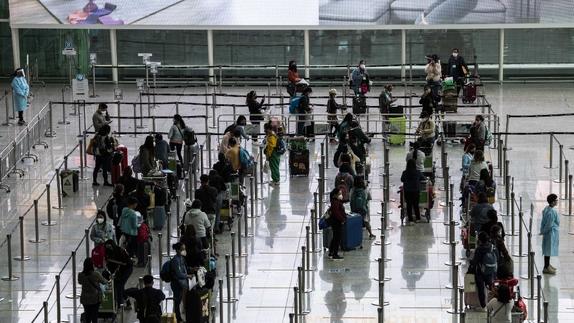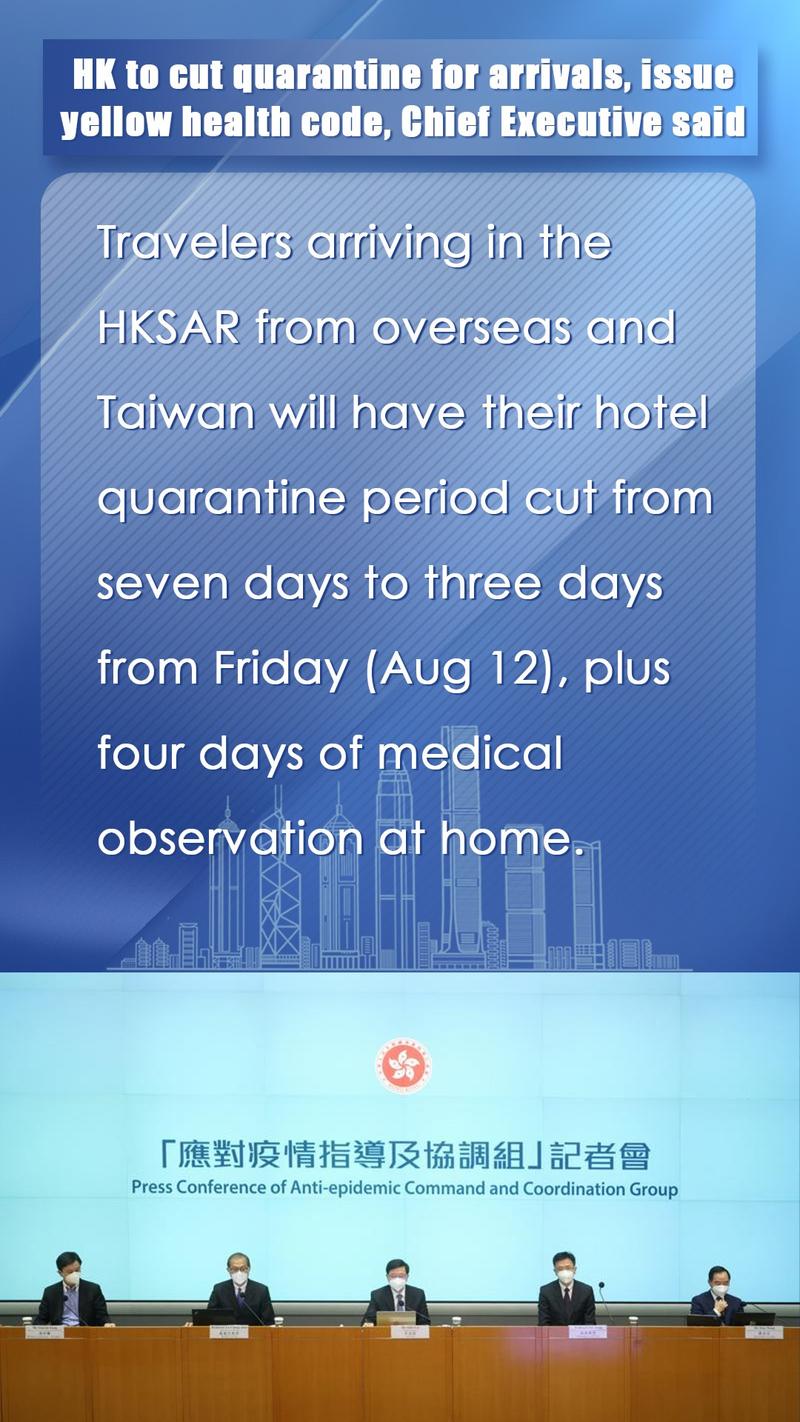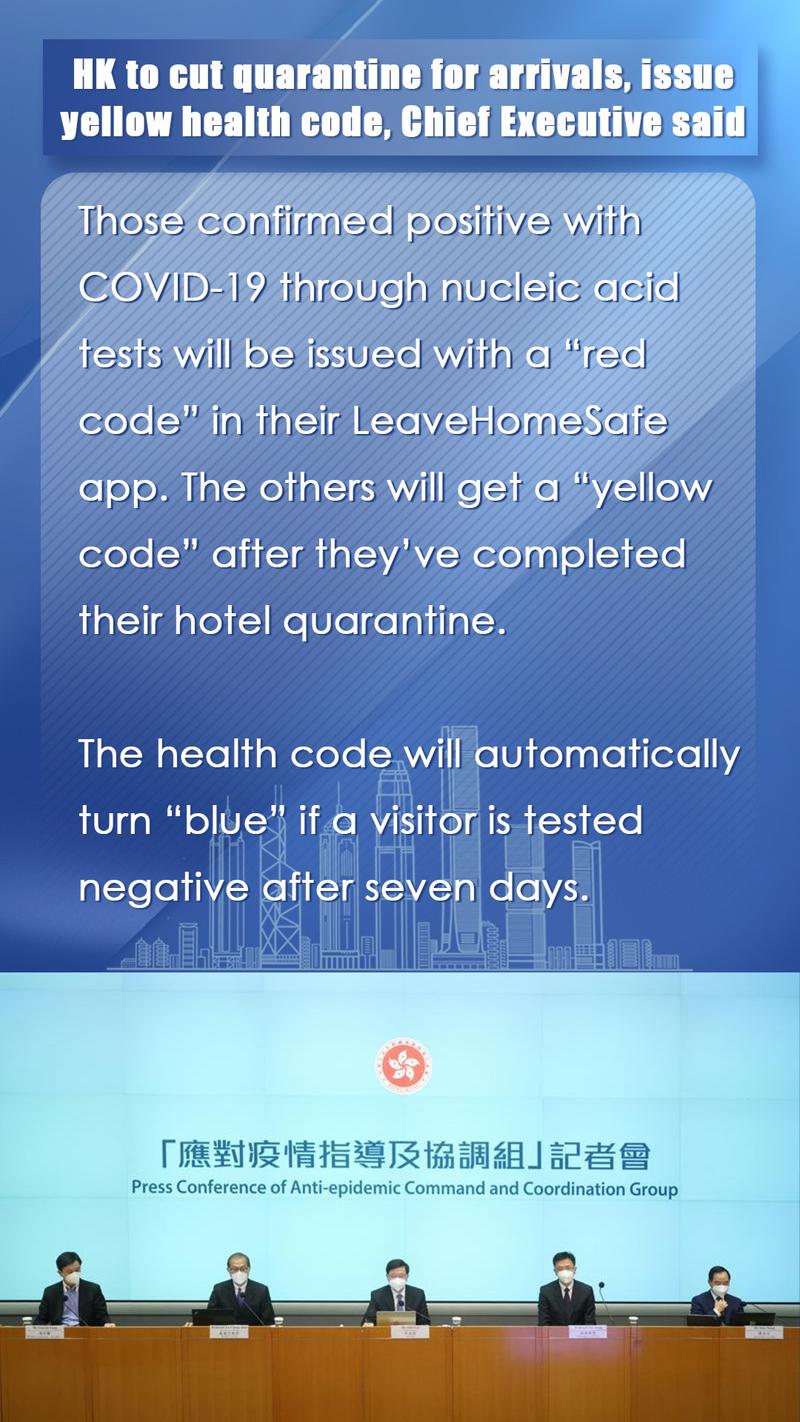 Passengers line up to be taken to hotel quarantine at the Hong Kong International Airport on April 1, 2022.
(ISAAC LAWRENCE / AFP)
Passengers line up to be taken to hotel quarantine at the Hong Kong International Airport on April 1, 2022.
(ISAAC LAWRENCE / AFP)
Travelers arriving in the Hong Kong Special Administrative Region from overseas and Taiwan will have their hotel quarantine period cut from seven days to three days from Friday, plus four days of medical observation at home, Chief Executive John Lee Ka-chiu said on Monday.
He said those confirmed positive with COVID-19 through nucleic acid tests will be issued with a “red code” on the LeaveHomeSafe app. Others will get a “yellow code” upon arrival in the city. Those with a “yellow” code can take public transport and go to work or visit shopping malls and wet markets during the medical surveillance period. But they cannot enter premises that require a vaccine pass, including restaurants, bars, fitness centers, playgrounds and indoor entertainment venues.
Secretary for Health Lo Chung-mau said the original 7-day hotel quarantine is no longer cost-effective amid efforts to reopen links with the international community
The health code will automatically turn “blue” if a visitor tests negative after seven days, allowing the person to enter premises regulated by the vaccine pass, Lee said.

Chief Executive John Lee Ka-chiu said the SAR government aims to strike a balance between pandemic control and economic development while continuing to reduce severe cases and deaths
ALSO READ: Virus: HK sees slight decrease with 4,040 new cases, 7 deaths
Lee said the SAR government aims to strike a balance between pandemic control and economic development while continuing to reduce severe cases and death.
Secretary for Health Lo Chung-mau said the original 7-day hotel quarantine is no longer cost-effective amid efforts to reopen links with the international community. The official data showed that only 4 percent of incoming travelers have been confirmed to be infected with COVID-19, with half of them detected through nucleic acid tests at the airport.
Lo said that arrivals are required to conduct health observation checks themselves for three days after the first week. They will need to undergo a rapid antigen test daily for 10 days, as well as five nucleic acid tests.
Lo warned that breaching the compulsory quarantine order is a criminal offense, and that offenders are liable to be jailed for six months, as well as pay a fine of HK$25,000 ($3,185).

ALSO READ: Fresh cases push HK's COVID-19 tally past 5,000 mark
Lee added that the HKSAR government is in discussions about resuming quarantine-free travel with the Chinese mainland while ensuring the cross-border travel complies with the mainland’s anti-pandemic policy.
The HKSAR reported 4,040 new COVID-19 cases and seven deaths on Monday, bringing the city’s death toll during the fifth wave of the pandemic to 9,334.
Legislator Tan Yueheng expressed support for the government’s decision to cut quarantine, saying this would help Hong Kong boost its economy, restart business exchanges, and revive local industries. He said he hopes that the government will strictly implement the quarantine plans, strengthen related law enforcement, and further optimize entry arrangements at the airport.
Chow Pak-chin, president of local think tank Wisdom Hong Kong, said it is a good time to ease COVID-19 entry rules based on scientific data analysis, adding that the vitality of the virus is also expected to be lower amid the scorching heat in August.
He called on the government to closely observe the infection data under the new measures to assess the risk of further outbreaks.
READ MORE: Virus: HK logs 4,123 new cases, suspends classes at nursery school
Regarding calls for a further relaxation of measures, such as a total exemption from quarantine arrangement for overseas arrivals, respiratory specialist Leung Tsz-chiu said, “it is not the time yet”. He said the BA.5 — the most common variant in the world — accounts for only about 10 percent of the infections in Hong Kong. The city should make efforts to contain the spread of the most contagious virus strain in the city, Leung added.
Xi Tianqi contributed to the story.
Contact the writers at shumanchen@chinadailyhk.com


